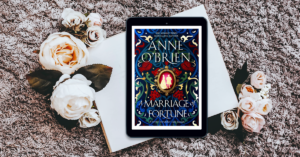Here are the first pages of A Marriage of Fortune
Meet Margaret Mautby Paston and her daughter Margery
A Promise of Things to Come …
Sit down for a few minutes with a cup of tea and enjoy!
Prologue
Margaret Mautby Paston
Why is it that an unsuitable marriage can all but tear a family
apart? My children, in spite of all the care I lavished on them, to
instil in them a sense of duty, are becoming a wound to my heart.
My neighbours in Norwich say that I have enough trouble
heaped on my new silver platters with the fate of Caister Castle,
that the siege and loss of such a notable possession is the greatest
calamity that could befall us. I will not refute it. To hold on to
Caister, a castle which seems to be desired by every warring family
in the land, not least the mighty Duke of Norfolk, is becoming
far beyond Paston means. But in my frequent moments of despair,
I might reply that the failure of my children to make desirable
marriage alliances is threatening to hack all respectability from
beneath Paston feet.
Our attaining some semblance of gentry status as castle-holders
is recent.
My children, without any help from our enemies, might wilfully
destroy the whole edifice.
My two eldest sons, Sir John and Jonty, with unfortunate,
but truthful reputations for dalliance, are incapable of bringing
a successful marriage proposal to fruition. Bestowing kisses and
promises is a weekly occurrence; signing a marriage contract is
anathema to both of them.
But it is my daughters who cause me anxious hours and sleepless
nights. One estranged from me; the other infused with an unsettling
dose of disobedience. These marital missteps might prove
an even greater cataclysm to us than the loss of Caister Castle.
That is not all. I have a sister-in-law struggling to hold on to
her children’s inheritance, amidst all the horrors of treason and
hostile relatives. Will she accept Paston help? Not willingly. She is
as intransigent as any Paston.
Once, I was considered to be a woman capable of good humour.
Laughter is now no longer a recognisable element in my life. Joy is
a distant memory. How have I become so morose and manipulative,
like a spider sitting in the centre of its web, spinning endlessly to
keep the family protected?
I can fight to hold on to a castle under threat. And I will do it.
But in the name of the Blessed Virgin, what do I do with
errant daughters, to bring them safe-returned into the Paston fold?
I could never have believed that Margery and Anne, my once compliant
daughters, could cast our family into such a maelstrom
of social censure. I believe it now.
Chapter One
Margery Paston
The Paston House in Norwich, Autumn 1467
I was given the task of helping him to collect up the documents
appertaining to rents owed to us in Norwich. My mother was
short of money and our tenants, as ever, slow to pay, and so must
be chivvied with a visit. He took them from the coffer where
they were stored, passing them to me. I looked at the street named
on every document and placed them in order of distance from
our Norwich house. He handed me another. Our hands touched,
his fingers just brushing mine. Not deliberately, for he had too
much honour for that, and knew that it would not be appropriate
for him to make so intimate a gesture, yet with that briefest of
contacts he turned his head and we regarded each other. The
sorting of documents was abandoned.
How often had our hands touched in such a manner, how often
had our eyes met in concern or laughter or merely acknowledging
our existence, before sliding away. That morning, it was different.
Slowly, he stood, taking the document from me, taking care not
to touch me again.
He was taller than I with a shock of fair hair that had fallen
over his forehead. There was dust on his hands and the cuffs of
his well-worn houppelande, fit for nothing but a morning’s hard
work amongst the Paston documents, but he was dressed with
his customary neatness in well-cut russet wool as befitted a man
of professional rank. I studied his face with deliberate courage,
refusing to allow my gaze to fall away in case it expressed too
clearly the thoughts that raced through my mind. What did I see?
The fair skin, pale brows, straight lips that rarely smiled. His eyes
were clear and grey, always alert and assessing. This was Master
Richard Calle, bailiff to the Paston family, the most highly trusted
man in our household.
‘I think the task is complete, Mistress Margery. My thanks for
your help,’ he said, his voice cool and calm as always, even when
under duress from a recalcitrant tenant. ‘I will arrange a visit to
those in arrears. If you would be pleased to inform your mother
that all is in hand.’
But today I did not wish to speak of rents and business. ‘What
do you think of me, Master Calle?’ I asked.
I thought that he sighed, just a mere exhalation of breath. I
had never been so forward, so provocative, but now I was almost
twenty years of age and had acquired a Paston mind of my own.
It was difficult not to, living in close proximity to my mother and
grandmother, both women with a will as strong as the iron lock
on the abandoned coffer.
Master Calle did me the honour of not pretending to misunderstand
my question, or being shocked by it.
‘I cannot say, Mistress Margery.’
‘Why can you not say?’
He placed the document carefully on the table with the rest,
turning away from me, yet he answered.
‘I must not say. It would be highly ill-advised for me to speak
what is in my mind.’
‘That is no more of an answer,’ I replied, concentrating on the
skill of his hands as he deftly rerolled a number of documents.
They were long-fingered, broad-palmed, and I wished that I might
feel the touch of them again. Would he never take my hands in
his, as a lover might do with his beloved?
‘Because what I might think of you must not be, Mistress
Margery. As I must not ask what you think of me.’ A single line
developed between his brows. ‘It is wrong of you to ask me.’
I allowed an awkward silence to develop after this statement,
waiting to see if he would break it. When he did not, I ventured
a mild reply.
‘We have known each other a long time, Master Calle.’
‘I am aware.’
‘For many years. Since I was a child.’
‘Yes.’
‘Do we not know each other well?’
‘Yes. As well as any member of your family knows its bailiff.’
Ah. But there was the crux of the matter. I continued my
pursuit of him.
‘I think that I may say that we do not dislike each other.’
‘We may say that.’
I walked round to stand in front of him. Now there were tiny
lines of disquiet beside his mouth.
‘Would I be a good wife to you, Master Calle?’
This time it was Richard Calle who paused, as if in astonishment
that I should ask. Then:
‘No!’
It was an explosive answer, his voice not quite as level as it had
been.
‘Why would I not? I only ask that you answer me truly, Master
Calle.’
His expression remained severe, giving me no indication of
what might be in his heart.
‘Then yes, if it is truth that you want. You would be the perfect
wife.’
My throat dried, my own heart gave a sharp beat.
‘Would you, then, be a good husband for me?’
This time there was no hesitation. Denying his usual care, he
had picked up one of the documents again, his hands clenched
around it, creasing the legal agreement between Paston and some
unknown Norwich citizen.
‘No. And no. I would not. And do not ask me why not. You
know well the answer without my spelling it out for you.’
Now there was anguish in his eyes, in the twist of his mouth,
but I would show no mercy.
‘I want to hear you say why you will reject what I think has
grown between us, unspoken. I wish it to be unspoken no longer.’
‘But why, Mistress Margery? Of what advantage would it be,
other than to bring heartbreak for both of us?’
It was not a comfortable question. It was full of despair.
‘A whim?’ I replied. ‘A desire to know that a man might admire
me?’
‘I am too old for you.’
‘That is not it.’
‘No. But it does not weigh well in the balance of why I am no
husband for such as you.’
‘Then why are you not a fit husband? Speak truly, Richard
Calle.’
‘My family is not appropriate for a marriage between us.’
‘Why not?’
I would make him say what I knew was in his mind, because
it was in mine, too. Was it not in the mind of every member of
the Paston family, so strongly rooted that they would never even
consider that I would see marriage with this man? I would have
someone speak it aloud, even though I knew that his reply could
indeed break my heart.
The ravaged document was finally cast aside.
‘Margery, you know full well why not.’ And he proceeded to
destroy the pleasure I experienced in hearing him call me simply
Margery. ‘I come from a family of shopkeepers. What do they say
of us? Selling mustard and candles in Framlingham. My brother
is not even a merchant but merely a seller of commodities. What
would a Paston say to that? You have your feet planted firmly on
the edge of becoming a reputable gentry family with a castle to
your name and Sir John Paston betrothed to the Queen’s cousin. A
Paston daughter does not marry a bailiff, a man in employment, a
son of a shopkeeper. A Paston daughter does not wed an employed
man without land, a man for the past year without income since
your family is in dire financial need and I have had no payment.
What have I to offer you? You would be sneered at by the notables
of Norwich. You would not be invited across their threshold or to
eat at their table with a husband such as I would be. What would
your mother say? What would your grandmother Mistress Agnes
say? They would damn me for my presumption, and probably you
for your recklessness.’
‘But I know all of that . . .’
‘Of course you do. You also know how important marriage in
the family is to Mistress Agnes: prestige and income and land. Do
I need to remind you of the sufferings of your aunt Elizabeth?
Of course I do not. The story of your grandmother’s failure to
find her a husband with enough money to please the Pastons is
legendary. Your aunt was beaten and whipped because she could
not attract a suitable betrothed. Look at me, Margery.’ He spread
his hands wide at his side. ‘I have no security in money. I have no
land. I have no connections to help me take a step up the social
ladder, other than through my employment.’
‘I know all of that,’ I repeated, for indeed I did. None of it was
new to me. ‘And yet . . .’
‘I do not denigrate my skills,’ Richard Calle said. ‘I know my
own worth, and particularly to your family. I am the perfect bailiff,
hardworking and loyal. I can be trusted with any task, to handle
any amount of money. Would I thieve from my employer? I would
sooner become a beggar in the gutters of Norwich. My relationship
with your tenants is excellent. But that does not make me a
suitable Paston husband.’
Bitterness coated those final words, sharp as the aloes with
which my mother dosed us as a purgative. It was damning and all
true. There was no way forward.
‘Even if I want you,’ I said.
I watched as the muscles of his throat constricted. Never had
I been so outspoken, unless it was on my knees to plead that my
dreams for the future might be realised. It was one thing to beg
the Blessed Virgin’s indulgence, it was quite another to speak my
yearnings out loud to the man I wanted.
‘Even if you want me, Margery.’ Richard Calle remained
adamant, yet I sensed that beneath his unyielding demeanour his
self-control was becoming compromised. ‘You know that what I
speak is honest. I have a care for your reputation. And, before God,
for my dignity, too.’
I turned my face away in an anguish that matched his.
‘So I will be sacrificed for your dignity.’
‘Not entirely.’
‘Then why?’
How stern he remained despite my challenge. ‘You don’t want
me. You don’t need me. Months from now you will realise that to
offer yourself as my wife would be the greatest mistake of your
young life. Instead, you will wed a man who will give you wealth
and honour.’
‘But will I love him?’
‘That is not important. As you well know.’
I looked down at my hands that were clasped around the beads
of my rosary, although there were no prayers in my mind. Only
grief and impending loss.
‘Then you will reject me.’
‘Yes. My dear girl, I must reject you. I admire your courage in
speaking, but I cannot accept the offer of your love, even though
it is an invaluable gift.’
‘Even if I weep for it?’
‘Even if you weep.’ He stretched out a hand as if he would have
touched mine and then let it fall. ‘Oh, Margery, in God’s name do
not . . . It breaks my heart.’
‘But mine is broken, too. I beg you to reconsider, Richard.’
I deliberately called him by his given name.
‘I cannot. I will not. I am a servant. That is enough. It will be
easier for both of us if you do not seek me out. I regret that you
should ever have fallen in love with me.’
He walked away, pausing at the door as if all had still not been
said between us, but if that were so, any such intention on his part
was brutally rejected. With an obvious firming of his shoulders,
he lifted the latch, closing the door quietly behind him, leaving
me with a pile of unsorted rental agreements and a surge of
despair. Just as he had closed the door on any possibility of love
between us. A door that I had deliberately, heedlessly, opened. I
had offered myself to him and he had refused that offer. I should
have felt humiliation, but it was not that that made me sweep the
documents to the floor in a surge of temper. It was desolation and
regret that he should reject me for finer feelings. I could not doubt
that he was a man of honour; every word he had spoken about his
own position in the world had been unquestionably true, while I
had been ungracious. My mother would have been horrified if she
had heard me. My grandmother would probably have beaten me,
as she was used to beat my aunt Elizabeth when displeased with
her. I did not care. I loved him and nothing would change that.
I opened the door to find him still standing there in the shadowed
passageway, his back to me, his face turned towards the
wooden panelling. With the courage with which he had graced
me, I place my hand flat against his shoulder.
‘What would you say, Richard, if I told you that my heart is
full of love for you?’
‘I would say that you heart is mistaken.’
Now he walked away, turning into the hall. He did not look
back.
I had no doubts that he loved me, too.
Which did not soothe the hurt at his rejection.
A Marriage of Fortune published in paperback on 28th September
To enjoy more of A Marriage of Fortune, buy in your favourite bookshop or on Amazon.


